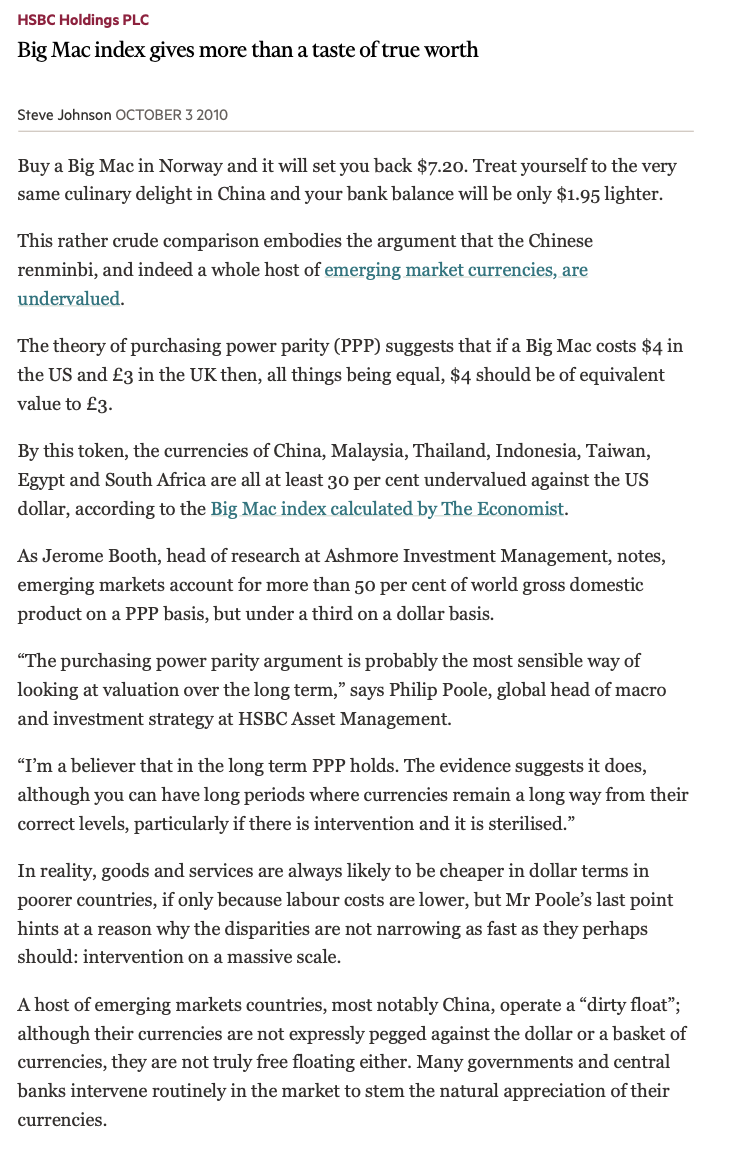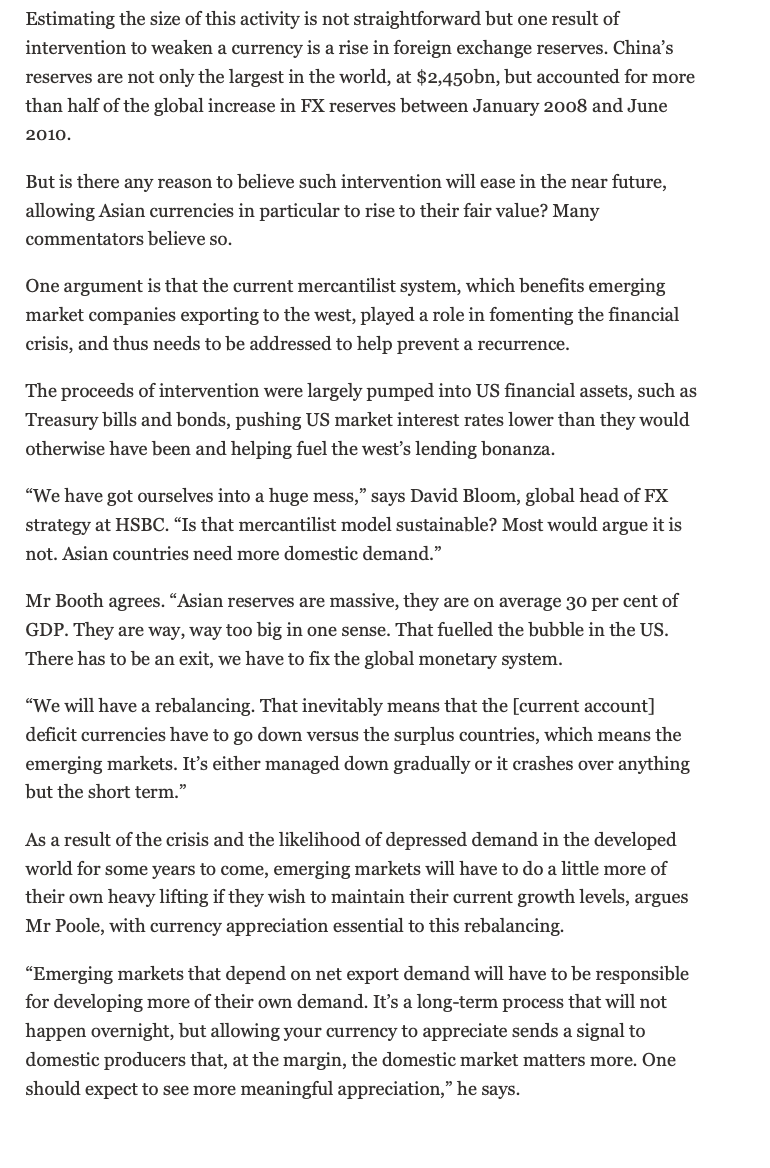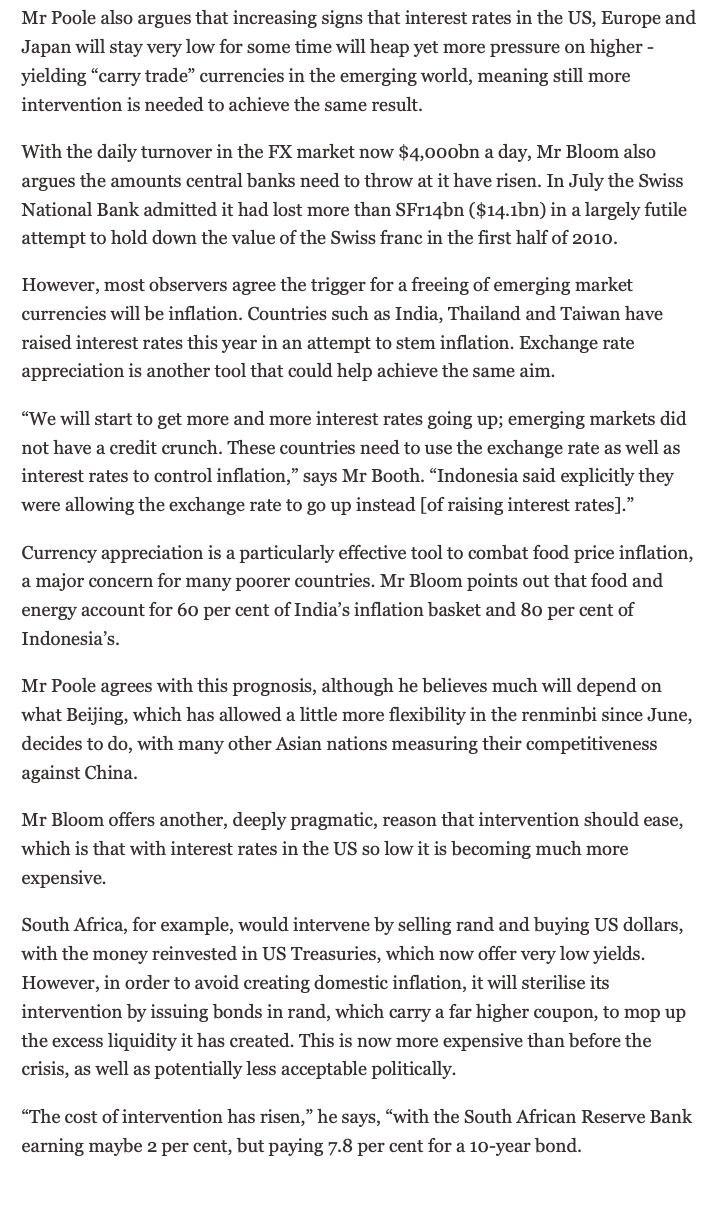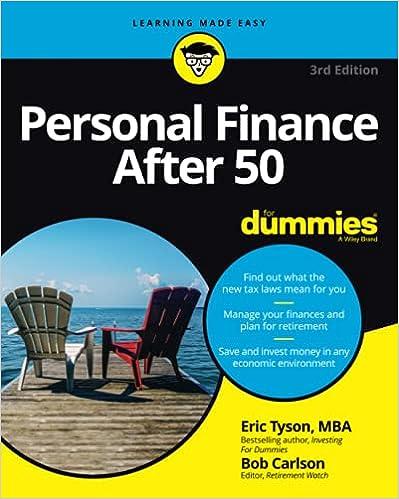1. Why do some countries try to avoid the appreciation of the local currency?
2. How could the low interest rates in the Western countries affect the value of the emerging market currencies?




HSBC Holdings PLC Big Mac index gives more than a taste of true worth Steve Johnson OCTOBER 3 2010 Buy a Big Mac in Norway and it will set you back $7.20. Treat yourself to the very same culinary delight in China and your bank balance will be only $1.95 lighter. This rather crude comparison embodies the argument that the Chinese renminbi, and indeed a whole host of emerging market currencies, are undervalued. The theory of purchasing power parity (PPP) suggests that if a Big Mac costs $4 in the US and 3 in the UK then, all things being equal, $4 should be of equivalent value to 3. By this token, the currencies of China, Malaysia, Thailand, Indonesia, Taiwan, Egypt and South Africa are all at least 30 per cent undervalued against the US dollar, according to the Big Mac index calculated by The Economist. As Jerome Booth, head of research at Ashmore Investment Management, notes, emerging markets account for more than 50 per cent of world gross domestic product on a PPP basis, but under a third on a dollar basis. "The purchasing power parity argument is probably the most sensible way of looking at valuation over the long term," says Philip Poole, global head of macro and investment strategy at HSBC Asset Management. "I'm a believer that in the long term PPP holds. The evidence suggests it does, although you can have long periods where currencies remain a long way from their correct levels, particularly if there is intervention and it is sterilised." In reality, goods and services are always likely to be cheaper in dollar terms in poorer countries, if only because labour costs are lower, but Mr Poole's last point hints at a reason why the disparities are not narrowing as fast as they perhaps should: intervention on a massive scale. A host of emerging markets countries, most notably China, operate a "dirty float"; although their currencies are not expressly pegged against the dollar or a basket of currencies, they are not truly free floating either. Many governments and central banks intervene routinely in the market to stem the natural appreciation of their currencies. Estimating the size of this activity is not straightforward but one result of intervention to weaken a currency is a rise in foreign exchange reserves. China's reserves are not only the largest in the world, at $2,450bn, but accounted for more than half of the global increase in FX reserves between January 2008 and June 2010. But is there any reason to believe such intervention will ease in the near future, allowing Asian currencies in particular to rise to their fair value? Many commentators believe so. One argument is that the current mercantilist system, which benefits emerging market companies exporting to the west, played a role in fomenting the financial crisis, and thus needs to be addressed to help prevent a recurrence. The proceeds of intervention were largely pumped into US financial assets, such as Treasury bills and bonds, pushing US market interest rates lower than they would otherwise have been and helping fuel the west's lending bonanza. We have got ourselves into a huge mess," says David Bloom, global head of FX strategy at HSBC. Is that mercantilist model sustainable? Most would argue it is not. Asian countries need more domestic demand." Mr Booth agrees. Asian reserves are massive, they are on average 30 per cent of GDP. They are way, way too big in one sense. That fuelled the bubble in the US. There has to be an exit, we have to fix the global monetary system. We will have a rebalancing. That inevitably means that the [current account] deficit currencies have to go down versus the surplus countries, which means the emerging markets. It's either managed down gradually or it crashes over anything but the short term." As a result of the crisis and the likelihood of depressed demand in the developed world for some years to come, emerging markets will have to do a little more of their own heavy lifting if they wish to maintain their current growth levels, argues Mr Poole, with currency appreciation essential to this rebalancing. Emerging markets that depend on net export demand will have to be responsible for developing more of their own demand. It's a long-term process that will not happen overnight, but allowing your currency to appreciate sends a signal to domestic producers that, at the margin, the domestic market matters more. One should expect to see more meaningful appreciation, he says. Mr Poole also argues that increasing signs that interest rates in the US, Europe and Japan will stay very low for some time will heap yet more pressure on higher - yielding "carry trade currencies in the emerging world, meaning still more intervention is needed to achieve the same result. With the daily turnover in the FX market now $4,000bn a day, Mr Bloom also argues the amounts central banks need to throw at it have risen. In July the Swiss National Bank admitted it had lost more than SFri4bn ($14.1bn) in a largely futile attempt to hold down the value of the Swiss franc in the first half of 2010. However, most observers agree the trigger for a freeing of emerging market currencies will be inflation. Countries such as India, Thailand and Taiwan have raised interest rates this year in an attempt to stem inflation. Exchange rate appreciation is another tool that could help achieve the same aim. "We will start to get more and more interest rates going up; emerging markets did not have a credit crunch. These countries need to use the exchange rate as well as interest rates to control inflation," says Mr Booth. Indonesia said explicitly they were allowing the exchange rate to go up instead [of raising interest rates]." Currency appreciation is a particularly effective tool to combat food price inflation, a major concern for many poorer countries. Mr Bloom points out that food and energy account for 60 per cent of India's inflation basket and 80 per cent of Indonesia's. Mr Poole agrees with this prognosis, although he believes much will depend on what Beijing, which has allowed a little more flexibility in the renminbi since June, decides to do, with many other Asian nations measuring their competitiveness against China. Mr Bloom offers another, deeply pragmatic, reason that intervention should ease, which is that with interest rates in the US so low it is becoming much more expensive. South Africa, for example, would intervene by selling rand and buying US dollars, with the money reinvested in US Treasuries, which now offer very low yields. However, in order to avoid creating domestic inflation, it will sterilise its intervention by issuing bonds in rand, which carry a far higher coupon, to mop up the excess liquidity it has created. This is now more expensive than before the crisis, as well as potentially less acceptable politically. "The cost of intervention has risen," he says, with the South African Reserve Bank earning maybe 2 per cent, but paying 7.8 per cent for a 10-year bond. "There is quite a reasonable cost to intervention and politically it's seen as a lot less acceptable than it was before because of the crisis.










